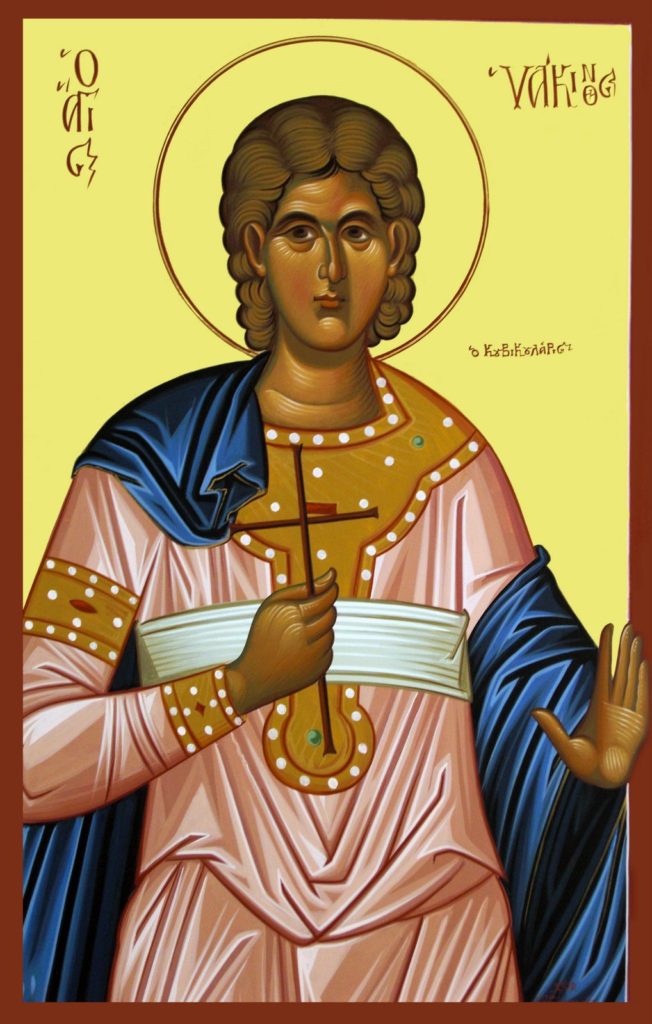

The holy martyr Hyacinth, a native of Caesarea in Cappadocia, was raised in a Christian family. The emperor Trajan made the boy his chamberlain, unaware that he was a secret Christian. One day, while the emperor and his entourage were offering sacrifices to idols, the young Hyacinth remained at the palace, shut himself up in a small room, and prayed fervently to the Lord Jesus Christ. One of the palace servants overheard him praying and denounced him to the emperor. He said that although Hyacinth was entrusted with an imperial position, he did not honor the Roman gods, and was secretly praying to Christ. Hyacinth was brought to trial before Trajan, who tried to persuade him to deny Christ and sacrifice to the idols, but the holy martyr remained steadfast and declared that he was a Christian. The twelve-year-old Hyacinth suffered for Christ in the year 108 in the city of Rome. Later, the saint’s relics were transferred to Caesarea.
O Lord our God, your holy martyr Hyacinth has deserved the crown of immortality on account of his good fight. Armed with your strength, he has vanquished his persecutors and crushed Satan’s dreadful might. Through his supplications, O Christ our God, save our souls.
Your martyr, O Christ, possessed the tree of life which is the faith in his soul, and which is more precious than the garden of Eden. By the Spirit he destroyed the tree of lies and was given a crown of glory for this from You, the supremely merciful Lord.
Romans 16: 17-27
Brothers and sisters, I beg you to be on the watch against those who cause dissension and scandal, contrary to the teachings you have received. Avoid their company. Some men serve, not Christ our Lord, but their own bellies, and they deceive the simpleminded with smooth and flattering speech. Your obedience is known to all, and so I am delighted with you. I want you to be wise in regard to what is good and innocent of all evil. Then the God of peace will quickly crush Satan under your feet. May the grace of our Lord Jesus Christ be with you.
Timothy, my fellow worker, sends you his greetings; so, too, do my kinsmen Lucius, Jason, and Sosipater. I, Tertius, who have written this letter, send you my greetings in the Lord. Greetings also from Gaius, who is host to me and to the whole church. Erastus, the city treasurer, and our brother Quartus wish to be remembered to you.
Now to him who is able to strengthen you in the gospel which I proclaim when I preach Jesus Christ, the gospel which reveals the mystery hidden for many ages but now manifested through the writings of the prophets, and, at the command of the eternal God, made known to all the Gentiles that they may believe and obey – to him, the God who alone is wise, may glory be given through Jesus Christ into endless ages. Amen.
Matthew 13: 10-23
At that time the disciples came to Jesus and asked him, “Why do you speak to the people in parables?” He answered: “To you has been given a knowledge of the mysteries of the reign of God, but it has not been given to the others. To the man who has, more will be given until he grows rich; the man who has not, will lose what little he has.
“I use parables when I speak to them because they look but do not see, they listen but do not hear or understand. Isaiah’s prophecy is fulfilled in them which says: ‘Listen as you will, you shall not understand, look intently as you will, you will not see. Sluggish indeed is this people’s heart. They have scarcely heard with their ears, they have firmly closed their eyes; otherwise they might see with their eyes, and hear with their ears, and understand with their hearts, and turn back to me, and I should heal them.’
(Jesus continued) “But blest are your eyes because they see and blest are your ears because they hear. I assure you, many a prophet and many a saint longed to see what you see but did not see it, to hear what you hear but did not hear it.
“Mark well, then, the parable of the sower. The seed along the path is the man who hears the message about God’s reign without understanding it. The evil one approaches him to steal away what was sown in his mind, .The seed that fell on patches of rock is the man who hears the message and at first receives it with joy. But he has no roots, so he lasts only for a time. When some setback or persecution involving the message occurs, he soon falters. What was sown among briers is the man who hears the message, but then worldly anxiety and the lure of money choke it off. Such a one produces no yield. But what was sown on good soil is the man who hears the message and takes it in. He it is who bears a yield of a hundred- or sixty – or thirtyfold.”
Icon courtesy of Jack Figel, Eastern Christian Publications – ecpubs.com
Sunday, July 2 –